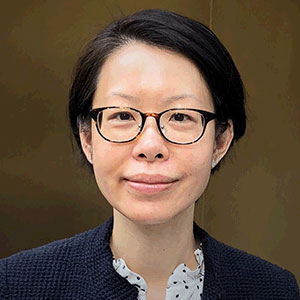Finding Inclusivity
Institutional Investor at the DE&I Roundtable in October 2022 recognized 12 industry leaders for their work commitment, and Leadership to diversity. Here are some excerpts from our conversation with Carol Chan.
In her role as Deputy Chief Investment Officer and Director of Finance at EY, Carol has led diversity initiatives on her own team, more widely at the professional services firm, and among the college students she mentors. Since she joined EY in 2010, she has grown the manager base exponentially from 12 to 32 managers, achieving 25% that are minority or women-owned managers. Similar to her team meetings (where she has the newest team members speak first to encourage diversity of thought), she attends managers’ due diligence meetings with keen interest on the inclusivity and diversity among the risk-takers.
Since Carol graduated from the London Business School and the Wharton School, she has been building a pipeline of females across the financial services industry. She supports Girls Who Invest and is active in non-profit organizations that focus on development and empowerment of women in finance, such as Financial Women’s Association, where she mentors minority college students.
The following has been edited for clarity.
 How do you define diversity?
How do you define diversity?
Apart from defining diversity as minority- or women-owned fund managers, we also focus on investment teams that are diverse, whether they have female PMs as risk-takers, or people from different cultures or different ethnicity on the team. Right now, we have about 10% of our assets managed by “diverse teams”, which account for close to 20% of the investment fees that we pay.
As an Asian female asset allocator, DEI is something very close to my heart. “Diversity and inclusion” to me is about respecting and appreciating the differences among people, whether it’s in their value, background, culture, experience, communication styles, opinions. Being inclusive is not just about accepting authenticity, but also valuing and respecting authenticity – and “equity” to me means fairness of compensation, as well as advancing opportunities based on one’s contribution, regardless of gender, ethnicity and race.
What does diversity mean to you?
Apart from building a diverse investment team, practicing diversity and inclusion is about being empathetic, and creating a belonging culture. I don’t just practice this with my investment team, but also across EY. We have something called EY Circle, which is grouping team members from across functions and aligning them as a “family”. We get together every quarter, and we build a sense of community and belonging through conversations and connections by creating a safe space for team members to talk about things that concern them and reflect the issues to leadership.
I’m also very fortunate that I’m able to contribute back to the community by helping to build a robust pipeline of females in the financial services industry. In addition to speaking at events, I work with minority college students and share some of my career lessons learned and encourage them to take calculated risks and pursue new opportunities in the financial services sector.
How do you perceive diversity moving forward?
That’s a little bit of a tricky question: Part of the reason why we don’t see a lot of diversity in asset management is because we have not built a substantial pipeline, and it takes time for students with diverse background to get into the industry and get promoted to senior roles.
Today, we have roughly 12% to 15% of the portfolio managers in the industry who are female, globally and within the U.S. – and through the Diversity Project led by Helena Morrissey, the industry is trying to target 30% female fund managers by 2030. You can see, we’re still far away from that goal. Ultimately, what I’d like to see is the diversity of the asset management field mirroring the labor force, and I’m very focused on building the pipeline right now.
What is your proudest accomplishment?
I would say that I have a keen sense of finding people who are more inclusive or pro-diversity. Eight years ago, we were doing an international small cap manager search, and there was one shortlisted team specifically that stood out for me. The team had people from different cultures and different continents.
Even though the lead PM is a white male, his style is very inclusive: He runs annual off-site meetings, and he lets everyone from his team lead a segment – regardless of how senior or junior they are – I believe his inclusive approach will prove to generate better investment performance. We hired him, and two years later, he was promoted to be one of the CIOs in the firm. So the ability to identify a good leader in the DEI effort was one of the things that I am proud of.
I feel honored to be a voice on DEI issue. I recognize that we each play a part and if my actions (large and small) lead to changing the way EY and the financial sector approaches hiring, team communication and investing, then that is a legacy that I can be proud of.
For the full list of DEI Award winners, visit Allocator Intel here.
To discuss the content of this article or gain access to like content, log in or request membership here.
